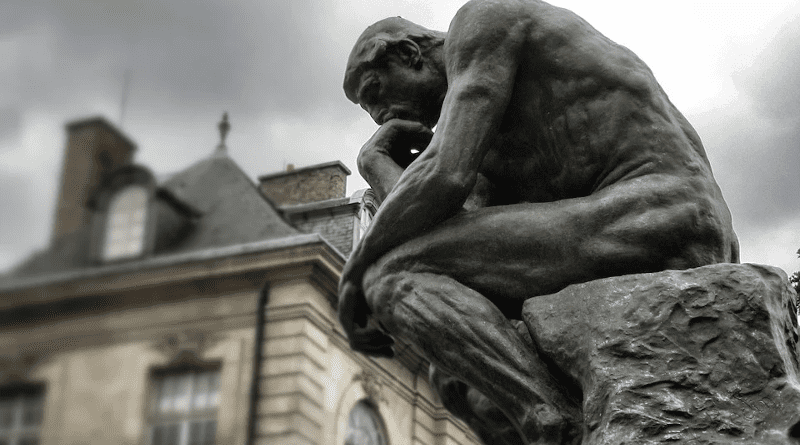Early Notes Towards A Perspective Of A Deeper Self: Paradigms Of Seeing Things And Beyond – Essay
In my previous column, I wrote about how we ought to view the issue in Ukraine, using how I viewed the missing Malaysian airline MH370 as an example of theorizing about what we can know. I discussed how knowledge is produced, and in journalism, as it is controlled by the state or the corporate sector, the editing room is a location of the contestation of power of knowledge/perception/consciousness production.
We need to go back to the discussion of the philosophical-psychological basis of knowing. Of impermanence of knowledge, of the post-Newtonian world, and of the nature of paradigms.
Impermanence and the act of knowing
Changes are the permanence of things we see and feel and live by. There is never a moment in the blink of the shifting consciousness within us that is not changing. Every thought moves back and forth as if each thought is an autonomous being, inhabiting what we call consciousness that perhaps has its house in the physical matter sitting atop our neck, called the head which embodies the skull which protects the grey matter and the corpus callosum and the mid-brain and the reptilian brain.
The above is the biological-ideological “state apparatus” of our individual self. We are what we think we are and no one else can know what we are, and what governs us within is inner sensibility and introspection and the will to be human: to exercise the skills of problem-solving and to create useful and useless artifacts that define us as a “thinking animal” that possess language, thought, and communication — these define the activity of the brain in all its glory of its plasticity, to direct action.
And we live in an age of complexity, chaos, multi-dimensionality of experiences and knowledge acquisition, of the dynamics and cybernetics of things around us, data that get bombarded into our consciousness — this lived experience crafted autonomously from birth till the moment of death — in a world wherein we cannot differentiate between information, knowledge, propaganda, truth, post-truth, fake-news and all forms of memes of information we consume, in a world of endless Vygotskian social interactions this Piagetian self had to endure and lastly in a world increasingly networked.
We have multiple selves – physical, emotional, psychological, psycho-social-cybernetic, and of course spiritual and soulful, assuming that these last two exist.
We can never comprehend our “true self: except through the act of imagining who we are or being defined by others who we should be thinking we are.
Because truth is a problematic word in itself.
Beyond the post-Newtonian world
We live in a post-Newtonian world of interconnectedness. The old paradigm Structural-Functionalism a child of Logical-Positivism of the late 1800s Vienna Circle borne out of world seen through the eyes of Mechanism or the universe as heavenly spheres, all in place, humming the sound of Newtonian spheres — “Music of the Newtonian Spheres” — this has long collapsed. The Copernican Revolution forced Galileo to recant his “scientific blasphemy.”
Fields of Social Sciences — from Anthropology to Psychology to later day theoretical proposition concerning the “Metaverse” — have become terrains of questionable grand-narrative worldviews of proposition, as what the now proverbial Kuhnian Shift has done. Old school. Science moves like the march of the grand horde of Temujin or Tamerlane. Mongolian invasion of the scientific-cognitive enterprise.
Then came Critical Theory, borne out of the Marxism of Things, a specter that swept the world of academia, its production house the prominence of the Frankfurt School of Social Research, a challenge to the Vienna Circle of Logical-Positivists.
The universality of organized chaos reigns …
On paradigms
Paradigms are houses of the theoretical holies, a cognitive-hypotheticalizing abode of theories, methodologies, assumptions, premises, and applications of perspectives seen from this and that eye view.
Ways of looking lead to ways of knowing – this is contingent upon the production of perceptions testable through the five or seven steps of the scientific process.
Paradigms inform methods that inform the way to arrive at the truth. The scientific method itself is a cultural practice, of which the act of investigating and setting up study designs — be they experimental or naturalistic or whatever in-between — is a cultural process of speaking and using the language of “science” draw from the doing of science historically from the logical-positivist perspective.
In the period when the Human Sciences started borrowing from the tools and techniques of the Natural Sciences for the former to allow it to be accepted as “legitimately science,” much to the annoyance of the Pure Scientists, in the 1900s mainly the debate was fierce.
Today, we have the “Social Sciences” as an area of studies with its own cultural logic of scientificness — from the language of investigating used to the reporting of it (validity, reliability, triangulation, etc.) — standing tall with the pure scientist who has come to accept that there is no difference between the intention, act, institutionalization of studying molecules with the study of human emotions. Both can have the rigor of science depending on the method used and the process of validation and falsification the study is made to go through.
Today, every field of study wished to be a science.
Herein lies the evolution of the art and science of looking at things. At phenomena.
We must first observe butterflies!

